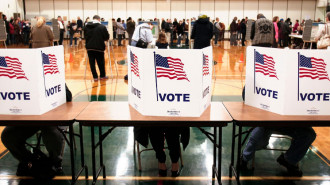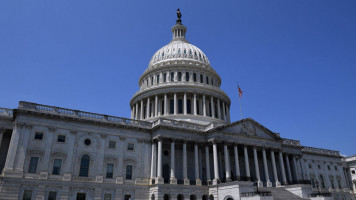'Vague and fabricated': BDS movement slams Israeli accusations of 'terror links'
The Boycott, Divest and Sanctions (BDS) movement targeting Israeli's multi-decade occupation of Palestinian territories has dismissed accusations by Tel Aviv of "terror links" as "wildly fabricated".
"This wildly fabricated and recycled propaganda report from the far-right Israeli government cannot be dignified with any response," the BDS movement statement said of the latest Israeli accusations.
Israel's strategic affairs ministry, which leads the country's efforts against the boycott movement, said it uncovered "extensive connections" between pro-boycott groups and activists affiliated with Hamas and the Popular Front for the Liberation of Palestine (PFLP).
Read more: For Palestine: Top five BDS victories of 2018
The 80-page report claims several dozen current or former members of the Palestinian groups, both designated terrorist organisations by the US, European Union and Israel, are involved in BDS activity through Palestinian and international NGOs.
However, most of the cases were based on somewhat vague accusations of affiliation or expressions of sympathy for militant groups, in some instances connected to acts that took place years ago, according to the AP news agency.
A female Palestinian lawmaker cited in the report, for instance, has been jailed by Israel for over a year without being charged with a crime. At least two people on the list have received international recognitions for their human rights work.
A rare example of a person being convicted for a violent act was PFLP member Leila Khaled, who was involved in plane hijackings in 1969 and 1970, briefly jailed in the UK and released in a prisoner exchange. She is now 74 years old.
The BDS movement has grown in popularity overseas in recent years, in large part because of its nonviolent message. It declined to comment on the allegations in the Israeli report.
Israel has been taking more-and-more extreme measures in their crackdown of the protest movement, which has gained momentum in recent years as high-profile companies, artists and academics refuse to do business with the Israeli government.
Tel Aviv's harsh clampdown on these individuals and organisations seems to reflect the fact it feels threatened by growing awareness of its violations of international law and human rights.
Last year, Israel banned 20 international NGOs from entering the country, including the Paris-based Association France Palestine Solidarite, British charity War on Want, and the American Friends Service Committee - a Nobel Peace Prize-winning US Quaker organisation.
In 2017, Israel also banned a group of European politicians planning to visit to the country, over their alleged support for a boycott of illegal Israeli settlements.
Follow us on Twitter: @The_NewArab

![Palestinians mourned the victims of an Israeli strike on Deir al-Balah [Getty]](/sites/default/files/styles/image_684x385/public/2024-11/GettyImages-2182362043.jpg?h=199d8c1f&itok=xSHZFbmc)


![The law could be enforced against teachers without prior notice [Getty]](/sites/default/files/styles/image_684x385/public/2178740715.jpeg?h=a5f2f23a&itok=hnqrCS4x)
 Follow the Middle East's top stories in English at The New Arab on Google News
Follow the Middle East's top stories in English at The New Arab on Google News


